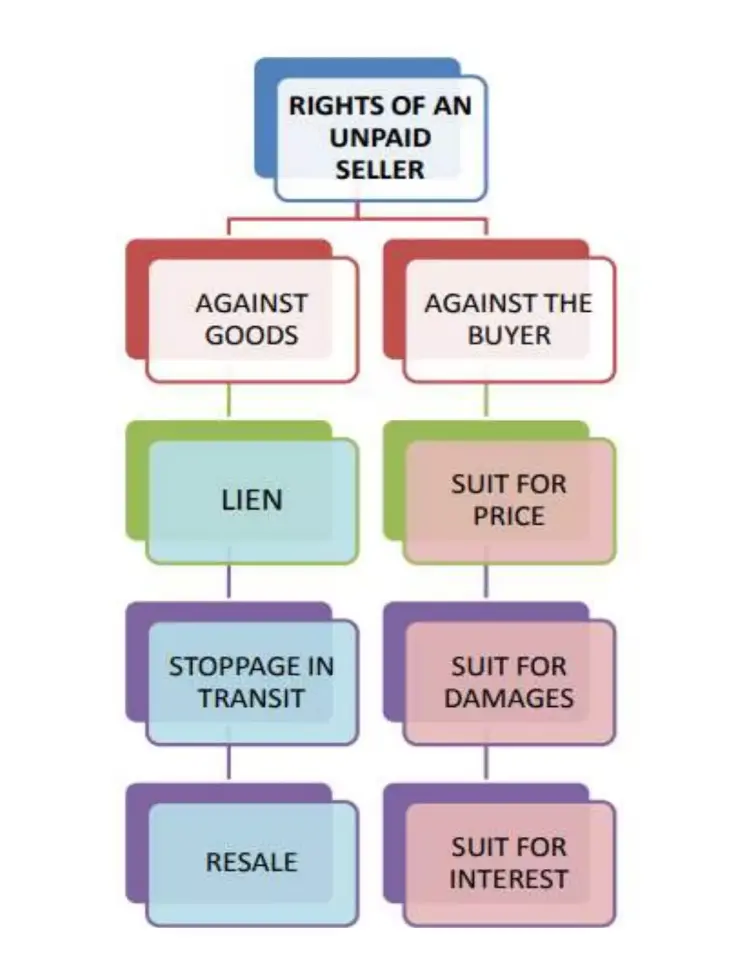Introduction
In commercial transactions, understanding the rights of an unpaid seller is crucial. The Sale of Goods Act, of 1930, provides several protections to sellers who haven’t received full payment for goods sold. Let’s explore these rights in a simple, conversational manner to help you grasp this important aspect of trade law.
Who is an Unpaid Seller?
An unpaid seller is someone who hasn’t received the full price for the goods sold or when the payment is overdue. This definition also includes agents or consignors in similar positions.
Also Read: Difference Between Sale and Agreement to Sell
Key Rights of Unpaid Sellers
The Sale of Goods Act, of 1930, grants unpaid sellers several rights to protect their interests and recover dues effectively. These include:

1. Right of Lien
The right of lien allows an unpaid seller to retain possession of the goods until full payment is made. This can be exercised if:
- The goods were sold without any credit terms.
- The buyer is insolvent.
- The credit term has expired, and payment is still pending.
2. Right to Stoppage in Transit
If the goods are in transit and the buyer becomes insolvent, the seller can stop the delivery and regain possession. This right helps prevent goods from reaching an insolvent buyer who might not pay.
3. Right to Resell the Goods
When payment isn’t made within a reasonable time, the seller can resell the goods. This can be done through an auction or a private sale, but the buyer must be notified beforehand. If the buyer pays before the resale, the seller must deliver the goods.
4. Right to Sue for the Price
If the seller can’t exercise the right of lien or stoppage in transit, they can sue the buyer for the price of the goods. This legal action ensures that the seller can claim the due payment even if the goods haven’t been delivered.
5. Right to Claim Damages
The seller can claim damages for any loss incurred due to the buyer’s default. This includes losses from the failure to accept goods or pay for them and additional expenses like storage or transportation costs.
6. Right to Retain the Goods
Similar to the right of lien, this right allows the seller to keep the goods until payment is made. This applies even if the goods were sold on cash terms, provided the seller retains possession.
7. Right to Rescind the Contract
If the buyer becomes insolvent before delivery, the seller can cancel the contract and refuse to deliver the goods. This rescission helps the seller avoid further losses and retain any advance payments.
Conclusion
Understanding these rights ensures that unpaid sellers can protect their interests and seek appropriate remedies under the Sale of Goods Act 1930. By knowing their legal options, sellers can navigate commercial transactions more confidently and safeguard their financial stability.
Frequently Asked Questions (FAQs)
1. What is the right of lien?
The right of lien allows an unpaid seller to retain possession of the goods until full payment is made.
2. When can an unpaid seller stop goods in transit?
An unpaid seller can stop goods in transit if the buyer becomes insolvent before the goods are delivered.
3. Can an unpaid seller resell the goods?
Yes, if the buyer doesn’t pay within a reasonable time, the seller can resell the goods, provided they notify the buyer beforehand.
Also Read: Rights and Duties of Buyer and Seller
Reference: rajdhanicollege.ac.in